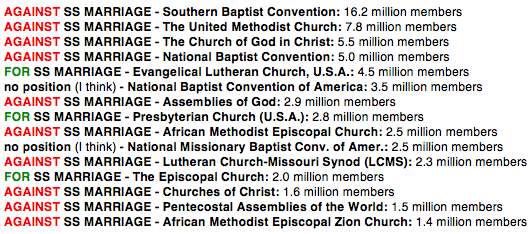Same-sex marriage and the Christian majority
Within ten minutes on Monday morning, I ran into not one, but two news stories covering the “Christian reaction” to the Supreme Court’s ruling last week affirming the rights of citizens to same-sex marriage. At first I was annoyed by the stories’ characterization of Christianity, but now I’m not so sure.
Story one, playing as I made my coffee and bagel, appeared on NPR. John Burnett reported, “Same-Sex Marriage Ruling Doesn’t Make it Biblically Correct, Pastors Says.” The thrust of the story:
Conservative churches and their congregants voiced the strongest opposition to same-sex marriages. Despite the high court’s decision, some churches say they’ll continue to obey a higher authority.
Then, as I sat down to drink my coffee and eat my bagel, I read in the Times, Michael Paulson’s piece, “With Same-Sex Decision, Evangelical Churches Address a New Reality.”
Ugh, I thought, there goes the media conflating all Christians with conservatives, or at least with those against same-sex marriage.
Where was the coverage of Christian congregations who had advocated for same-sex marriage for decades?
Where were the quotes from teary pastors, giddy that the same-sex ceremonies over which they’ve already presided can now become law?
Where was the reporting of statements like this one from the Presbyterian Church (U.S.A.): PC(USA) advocates celebrate supreme court decision on same-gender marriage?
Then again, it’s easy to complain about what’s not covered in the news. Easier, perhaps, than appreciating why editors make the decisions they do.
The more I reflected on my morning news encounters, the more I wondered if my progressive Christian bubble might just need to be popped a bit.
In reality, the vast majority of Christians in the U.S. are members of denominations that do not support same-gender marriage.
Here’s some rough numbers of the 15 largest protestant denominations grabbed from the Christian Post website:
 |
So, if my figuring and quick Googling is correct, of the 15 largest protestant denominations in the U.S., making up about 80 million Christians, only three denominations with 9.3 million members support same-sex marriage by way of national decisions.
And, don’t forget, there are 76 million Roman Catholics in the U.S. and the Vatican certainly doesn’t seem to be budging from its stance against same-sex marriage.
Yes, many individual Christians within these moderate to conservative denominations do support same-sex marriage, and/or the SCOTUS decision. Polls suggest something like 57 percent of Americans do favor allowing same-sex marriage. But the opposite is also true: many individuals within denominations that support same-sex marriage don’t, personally, support the right.
The Times and NPR stories gave little acknowledgement of the fact that many Christians (like me!) are supportive of the court’s ruling. But if by doing so they implied that support for same-sex marriage, according to “denominational teaching or guidance” in the U.S. is quite weak, I think I have to admit that’s a fair implication.
Let’s be honest: most progressive-leaning Christian denominations are quite small in number when compared to the moderate or conservative ones. This reality doesn’t mean news stories should lack nuance, but upon reflection, it does temper my righteous indignation at breakfast.
My takeaway, I suppose, is a reminder that Christian voices that support same-sex marriage must keep doing so, loudly, with Christian language, with biblical arguments, and amongst other Christians. Even as we in the church “make every effort to keep the unity of the Spirit in the bond of peace,” even as many of us rejoice in the court’s decision, even as the arc of the moral universe bends towards justice, justice-seeking for all God’s children must not slow.
Originally posted at A Wee Blether





